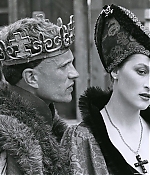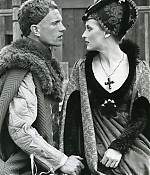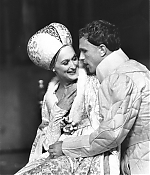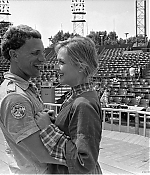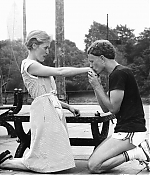|
Simply Streep is your premiere source on Meryl Streep's work on film, television and in the theatre - a career that has won her the praise to be one of the world's greatest working actresses. Created in 1999, we have built an extensive collection to discover Miss Streep's body of work through articles, photos and videos. Enjoy your stay.
|
Celebrating
25 years
of SimplyStreep
|
Henry V
June 24, 1976 - July 25, 1976
· The Delacorte Theatre
|
Directed by: Joseph Papp
· Literature: William Shakespeare
· Costume Design: Timothy Miller
· Production Design: David Mitchell

Young King Henry V (Paul Rudd) is persuaded to claim France as part of his kingdom and leads his army in an invasion. After a victory at Harfleur, his fortunes turn downwards, leaving him with plotting nobles, cowardly companions and an exhausted and outnumbered army. Before the battle at Agincourt, he rouses his men with a stirring speech on the glories of war and the English win the day. Henry gains control of France, and solidifies it by marriage to the French princess Katherine (Meryl Streep).
Cast & Characters
Production Notes
William Hurt made his New York Shakespeare Festival debut in this production.
Reviews
New York Daily News, Douglas Watt, July 01, 1976
Joseph Papp sometimes goes to extreme lengths to emphasize the more popular aspects of Shakespeare’s plays in order to appeal to a wide audience. In this production, the battle scenes are actually stages, with soldiers running pell-mell, bellowing smoke, a breakaway wall, and slow motion hand-to-hand combat. It’s a mess, but lively. Paul Rudd’s Henry is thoughtful but lacking in heroic stature. Michael Moriarty is better; as the Chorus he links the scenes engagingly. Meryl Streep gives a tarty, humorous, carefully phrased Katharine, and Philip Bosco’s Pistol, a cowardly braggart full of vitality and resonance, is excellent.
Joseph Papp sometimes goes to extreme lengths to emphasize the more popular aspects of Shakespeare’s plays in order to appeal to a wide audience. In this production, the battle scenes are actually stages, with soldiers running pell-mell, bellowing smoke, a breakaway wall, and slow motion hand-to-hand combat. It’s a mess, but lively. Paul Rudd’s Henry is thoughtful but lacking in heroic stature. Michael Moriarty is better; as the Chorus he links the scenes engagingly. Meryl Streep gives a tarty, humorous, carefully phrased Katharine, and Philip Bosco’s Pistol, a cowardly braggart full of vitality and resonance, is excellent.
The New York Post, Martin Gottfried, July 01, 1976
This is the biggest and best looking production the festival has ever presented. The only fault of this intelligent, adept rendition is Paul Rudd’s portayal of Henry. His acting is technically flawless but unemotional and impersonal. Rudd makes it seem as if Henry invaded France out of overgrown adolescent egoism rather than as a result of his decision to put aside his boisterous youth and become a wise and brave King. Meryl Streep as Katharine combines innocence and wile, but she seems too grown up, too sexy and too much for this Henry. Philip Bosco makes Pistol, the pretentious blowhard, a sympathetic clown.
This is the biggest and best looking production the festival has ever presented. The only fault of this intelligent, adept rendition is Paul Rudd’s portayal of Henry. His acting is technically flawless but unemotional and impersonal. Rudd makes it seem as if Henry invaded France out of overgrown adolescent egoism rather than as a result of his decision to put aside his boisterous youth and become a wise and brave King. Meryl Streep as Katharine combines innocence and wile, but she seems too grown up, too sexy and too much for this Henry. Philip Bosco makes Pistol, the pretentious blowhard, a sympathetic clown.
The Hour, July 13, 1976
The bare stage becomes a thing of beauty in the French camp the night before Agincourt, with tents and torches and restless horses. The play itself comes off less well, its lack of drive and purpose reflecting the understated, unfocused playing of Paul Rudd in the title role. Papp pays so little attention to the written word that in Henry’s challenge to the people of Harfleur the interpreter gives an almost simultaneous transition, so Henry’s words are lost. Little loss, perhaps, but for no purpose other than cleverness. The other parts range from the execrable mincing chorus of Michael Moriarty, forever fiddling with his sword and cap (Papp’s fault, not Moriarty’s), to the marvelous Katherine of Meryl Streep, who herewith caps an astonishing series of characterizations in her first major New York season.
The bare stage becomes a thing of beauty in the French camp the night before Agincourt, with tents and torches and restless horses. The play itself comes off less well, its lack of drive and purpose reflecting the understated, unfocused playing of Paul Rudd in the title role. Papp pays so little attention to the written word that in Henry’s challenge to the people of Harfleur the interpreter gives an almost simultaneous transition, so Henry’s words are lost. Little loss, perhaps, but for no purpose other than cleverness. The other parts range from the execrable mincing chorus of Michael Moriarty, forever fiddling with his sword and cap (Papp’s fault, not Moriarty’s), to the marvelous Katherine of Meryl Streep, who herewith caps an astonishing series of characterizations in her first major New York season.
Time Magazine, December 06, 1976
Beginning the play as an erstwhile rakehell son, Henry (Paul Rudd) ends it as the lord of two realms who is planning to father an heir. The purpose of that utterly beguiling last-act courtship scene with Katherine (Meryl Streep) is, apart from statecraft, to show us that he has triumphantly undergone the arduous initiation rites of manhood. With the heraldic pennants flying at Central Park’s Delacorte Theater, Joseph Papp’s production does not stint on pageantry. While the evening is workmanlike, it never truly evokes Shakespeare’s “Muse of fire.” Rudd’s Henry seems apprenticed to his role rather than the master of it. Streep is a potent charmer as Katherine. Since I there is no admission charge, this is an enticing opportunity to follow Cole Porter’s advice and “brush up your Shakespeare.”
Beginning the play as an erstwhile rakehell son, Henry (Paul Rudd) ends it as the lord of two realms who is planning to father an heir. The purpose of that utterly beguiling last-act courtship scene with Katherine (Meryl Streep) is, apart from statecraft, to show us that he has triumphantly undergone the arduous initiation rites of manhood. With the heraldic pennants flying at Central Park’s Delacorte Theater, Joseph Papp’s production does not stint on pageantry. While the evening is workmanlike, it never truly evokes Shakespeare’s “Muse of fire.” Rudd’s Henry seems apprenticed to his role rather than the master of it. Streep is a potent charmer as Katherine. Since I there is no admission charge, this is an enticing opportunity to follow Cole Porter’s advice and “brush up your Shakespeare.”

